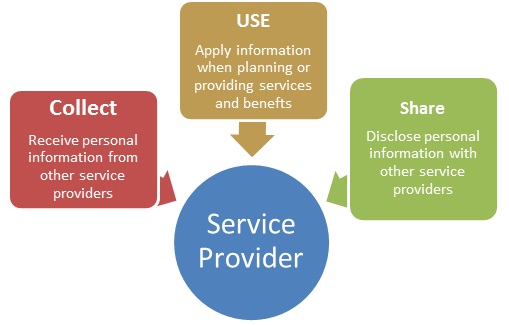Service Providers and Trustees
Information for Service Providers, including trustees
As a service provider, you are any person, organization or agency receiving funding from the provincial government or a government agency, to work with supported children. The definition also includes provincial government departments. Examples of service providers are:
- Child and Family Services (CFS) agencies and authorities
- foster parents
- schools
- police services
- regional health authorities
- youth criminal justice officers
- community-based agencies, and
- non-profit organizations
Service providers play an essential role in protecting and promoting the well-being of supported children. Services for supported children are most helpful and effective when service providers share information with each other in a careful and well-timed manner.
The Protecting Children and Supporting (Information Sharing) Act (previously called PICSA) allows service providers in Manitoba to collect, use and share personal information (including personal health information) about supported children, their parents and legal guardians.
Service providers can only share personal information with other service providers. The purpose of sharing personal information under the act is to plan or provide services and benefits for supported children

Personal information can only be shared under the act if it is believed by the service provider to be in the supported child’s best interests. The authority to share personal information is in addition to that already found in The Freedom of Information and Protection of Privacy Act (FIPPA) and The Personal Health Information Act (PHIA).
The benefits of sharing personal information include:
- improved services and outcomes for supported children
- timely sharing of information
- informed decision making
Trustees under The Personal Health Information Act (PHIA)
Trustees under PHIA can also share personal health information about a supported child with another trustee or with a service provider. However, for a trustee to share personal information about a parent or a legal guardian with another service provider or trustee, they must also meet the definition of a service provider under this act. A trustee that is not a service provider is not authorized to share personal information about a parent or legal guardian, but rather only of a supported child. A trustee is a:
- health professional
- health care facility
- public body
- health services agency
Read more about trustees and The Protecting Children and Supporting (Information Sharing) Act.
Legal Obligations about Information Sharing
Service providers and trustees must ensure that the sharing of personal information:
- is in the supported child’s best interests
- is necessary to plan or provide services or benefits to a supported child
- is limited to the least amount of information necessary
- is not prohibited by another act, such as The Child and Family Services Act and he Youth Criminal Justice Act
Also, when sharing personal information under the act, service providers and trustees must:
- include relevant information about the strengths of the supported child and his or her parents or guardians, where available
- take reasonable steps to ensure that the information is accurate and not misleading (e.g., confirm that the information is relevant and up-to-date)
Service providers and trustees can ONLY share personal information if they believe that it is in the supported child’s best interests to do so.
